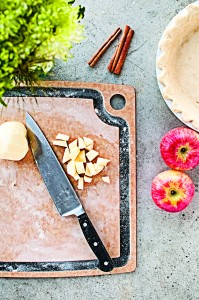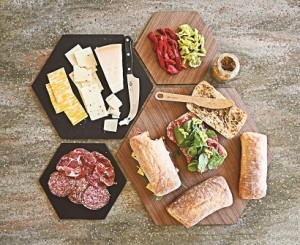An Epicurean Evolution
By Lorrie Baumann
Dave Benson and Anthony Ciardelli are the kind of men who don’t like to see things go to waste. That – and a little bit of serendipity – help to account for how a couple of guys who made their living building skate parks came to own a company best known for making cutting boards.
 The two of them had a company called TruRide that they’d started in 1997, and over the course of 10 years, they built around 400 skate parks for municipal parks and recreation authorities across the U.S. In 2002 and 2003, they were building one of those big skate parks during the holiday season when they looked around them and saw a lot of scrap pieces of RichLite, a wood fiber composite that they used to make the decking for skateboard ramps. They knew that the material had been used for 75 years to make surfaces for the foodservice industry, so it was safe to use in contact with food, and it occurred to them that they could use those scraps to solve some of their Christmas gift-giving needs. “We made cutting boards for our family and friends, and they loved them,” says Dave Benson, today the Chief Financial Officer and Co-Owner of Epicurean, a company best known as a manufacturer of American-made cutting boards.
The two of them had a company called TruRide that they’d started in 1997, and over the course of 10 years, they built around 400 skate parks for municipal parks and recreation authorities across the U.S. In 2002 and 2003, they were building one of those big skate parks during the holiday season when they looked around them and saw a lot of scrap pieces of RichLite, a wood fiber composite that they used to make the decking for skateboard ramps. They knew that the material had been used for 75 years to make surfaces for the foodservice industry, so it was safe to use in contact with food, and it occurred to them that they could use those scraps to solve some of their Christmas gift-giving needs. “We made cutting boards for our family and friends, and they loved them,” says Dave Benson, today the Chief Financial Officer and Co-Owner of Epicurean, a company best known as a manufacturer of American-made cutting boards.
 The company is adding to its product line this year with pastry stands, coasters, magnetic knife holders and hexagonal serving boards designed to dress up a table or buffet with both style and the durability of an Epicurean cutting board. The boards are still made in the U.S. from that same material, which is manufactured in Tacoma, Washington by a company with which Epicurean has a very strong relationship. The material is Forest Stewardship Council certified, which means that it’s produced from environmentally sustainable forests, and it’s NSF Certified, which means that it meets strict standards for safety. It’s also kosher certified. “What people like about it is that it’s very durable. It’s a low-pressure composite, so it’s still soft enough to score, so you’re not folding the edge of your knife when you cut,” Benson says. “It’s similar to an end grain maple board in hardness. It’s nonporous, dishwasher safe, easy to clean. We like to have our products be very utility, obviously quality-made, a product that will stand the test of time.”
The company is adding to its product line this year with pastry stands, coasters, magnetic knife holders and hexagonal serving boards designed to dress up a table or buffet with both style and the durability of an Epicurean cutting board. The boards are still made in the U.S. from that same material, which is manufactured in Tacoma, Washington by a company with which Epicurean has a very strong relationship. The material is Forest Stewardship Council certified, which means that it’s produced from environmentally sustainable forests, and it’s NSF Certified, which means that it meets strict standards for safety. It’s also kosher certified. “What people like about it is that it’s very durable. It’s a low-pressure composite, so it’s still soft enough to score, so you’re not folding the edge of your knife when you cut,” Benson says. “It’s similar to an end grain maple board in hardness. It’s nonporous, dishwasher safe, easy to clean. We like to have our products be very utility, obviously quality-made, a product that will stand the test of time.”
Epicurean’s product line today includes cutting tools, knife storage and kitchen utensils as well as cutting boards. And in addition to the RichLite boards, Epicurean makes a line of polyethylene cutting boards made from 100 percent recycled milk jugs. “We’re not all about wood fiber,” Benson says. “We’re about finding materials that are unique and quality…. We like to keep our eyes open, see what’s out there and what we can improve upon.”
The company also has a product line in development that adds stainless steel as a component and a product line for the craft beer market that includes mash paddles and flight servers, Benson says. “We’re also looking potentially at some unique type of wood cutting boards, again, made in the U.S.,” Benson says. “That’s part of our company philosophy – to manufacture as much as we can here in the U.S.”
Benson and Ciardelli have long since sold TruRide to focus on Epicurean. “With us, as we get a little older, and your lifestyle changes, getting married and having kids,” Benson says, “our passions maybe shifted a little towards housekeeping and cooking instead of skateboarding.”

You must be logged in to post a comment.